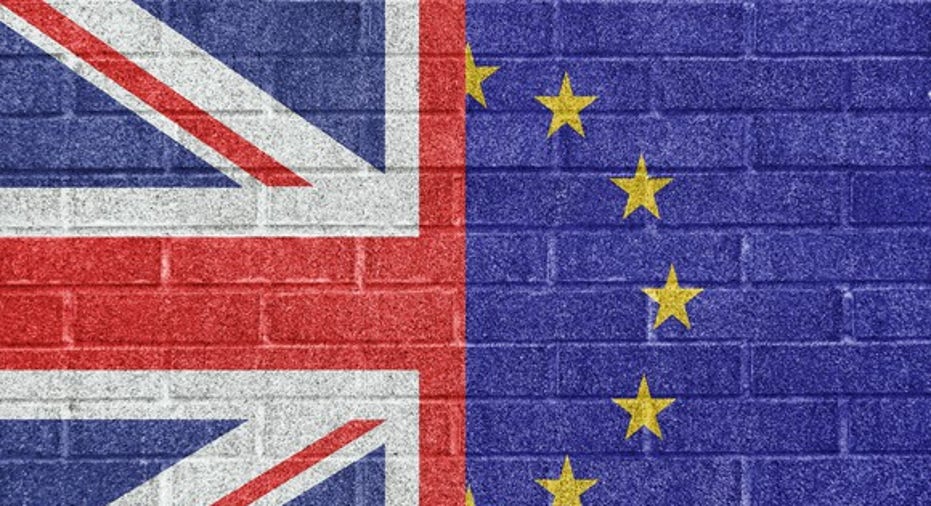The S&P 500's Worst Day in 2016

The S&P 500 (SNPINDEX: ^GSPC) had a strong performance in 2016, rising by double-digit percentages as investors continued the eight-year-old bull market. Yet there were times during the year when it looked like stocks might be poised to fall sharply. Although turbulent periods in the markets abounded during 2016, including in January and in the weeks surrounding the presidential election, the worst one-day performance for the S&P 500 came on June 24, when the index fell by 76 points, or more than 3.5%. That plunge came in response to the first unexpected voting result of the year: the U.K. vote in which residents decided to leave the European Union, which was subsequently dubbed Brexit and threw the prospects for global commerce into uncertainty.
Image source: Getty Images.
What Brexit did
The June vote gave the U.K. the ability to begin the exit process. Specifically, it gave the prime minister of the U.K. the right to trigger Article 50, the provision in the treaty that helped to create the European Union that relates to countries exiting the union. From there, the U.K. and the European Union will start negotiating terms under which the island nation can separate itself from the EU.
What prompted the vote was the fact that Britain has always stood apart from its EU peers. Unlike most of Europe's nations, the U.K. didn't join the euro common currency, instead choosing to retain its British pound sterling as its sovereign currency. In some ways, departing the EU will recognize the U.K.'s already clear intent that it didn't want to buy into the idea of the Union entirely in the first place.
Still, what sent global markets crashing downward was the potential impact that Brexit could have on the world's financial stability. Up for grabs in negotiations will be the extent to which the U.K. allows the free flow of labor and goods through its borders, as well as whether the EU will negotiate some sort of bilateral trade agreement with the U.K. that will mimic what EU members were allowed to do.
Why the Brexit fears didn't last
The stock market reaction to Brexit lasted for exactly two days. Following June 24's plunge, the S&P dropped another 2% the subsequent Monday, closing just above the 2,000 mark. Yet that would prove to be the bottom of the downward move. It only took until July 8 for the S&P 500 to climb back above the level on which it had closed before June 24's drop. Moreover, the U.S. stock market moved to subsequent new all-time record highs, essentially ignoring the move.
That said, Brexit wasn't entirely inconsequential. The value of the British pound fell sharply against the U.S. dollar, and the U.K. currency hasn't regained any substantial ground since mid-year. As a result, those companies that do extensive amounts of business in the U.K. have found their revenues and earnings depressed and are likely to continue to do so for at least the next year. Now that U.S. interest rates are on the rise, moreover, the threat of strong-dollar hits to companies that rely on the U.K. has only grown toward the end of 2016.
The flip side, though, is that the pound's drop has been a boon for U.K. companies. To the extent that British companies are able to keep doing business in Europe, the U.S., Japan, and other areas of the world that haven't seen the extent of currency damage that the U.K. has, British corporate profits are poised to soar. That will result in strong markets, and already, the FTSE 100 in London has climbed to all-time closing highs in the wake of a strong year-end performance.
What's coming down the road for Brexit?
Interestingly, the actual Brexit process really hasn't gone forward very far yet. Outgoing former Prime Minister David Cameron chose not to trigger Article 50 following the vote, and current Prime Minister Theresa May has faced legal challenges to her ability to trigger the article. The House of Commons voted in support of the Brexit move, but some are still calling for a second referendum to confirm or reverse the initial vote.
Nevertheless, for investors, the fact that Brexit had so little long-term impact on the market is just the latest example of how one-day losses often don't last. Traders panic, but those who are disciplined enough to realize that the investing thesis for most of their positions remains unchanged can stay the course and do well.
Even with the market having gone through some shocks in 2016, many investors remain optimistic about its prospects for the future. If markets remain as resilient in the face of future challenges as they did to Brexit, then 2017 could start up where 2016 left off.
The $15,834 Social Security bonus most retirees completely overlook If you're like most Americans, you're a few years (or more) behind on your retirement savings. But a handful of little-known "Social Security secrets" could help ensure a boost in your retirement income. For example: one easy trick could pay you as much as $15,834 more... each year! Once you learn how to maximize your Social Security benefits, we think you could retire confidently with the peace of mind we're all after.Simply click here to discover how to learn more about these strategies.
Dan Caplinger has no position in any stocks mentioned. The Motley Fool has no position in any of the stocks mentioned. Try any of our Foolish newsletter services free for 30 days. We Fools may not all hold the same opinions, but we all believe that considering a diverse range of insights makes us better investors. The Motley Fool has a disclosure policy.